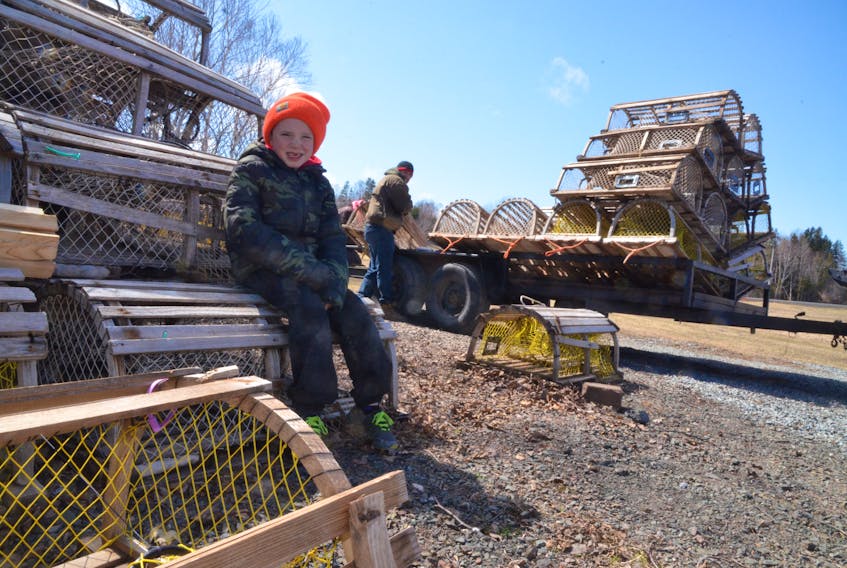“Three dollars a pound is what we’re hearing,” said Susan Beaton.
The Cape George, Antigonish County fisher was working on her new tiny home on Thursday.
It looks out over the grounds she fishes each spring from her boat The UnManned.
Water she doesn’t know if she’ll be fishing in two weeks.
“There’s a lot of unanswered questions this year,” said Beaton.
None of the 600 lobster fishermen along most of the Northumberland Strait and the Eastern Gulf of St. Lawrence do.
“We need an answer last Friday,” said Duane Boudreau on Thursday.
The president of the Gulf Bonafide Fishermen’s Association wants a ruling from Fisheries and Oceans Canada on whether there will be a season this year.
His members account for some of the 600 lobster fishermen from Nova Scotia and Prince Edward Island whose season begins in two weeks.
Fishermen from Nova Scotia voted two weeks ago to seek a bailout from the federal government in exchange for forfeiting their 2020 season. Prince Edward Island fishermen's associations are canvassing their members on a similar motion.
The fishermen are asking to be provided with the following bailout in exchange for not putting their traps in the water:
- A 12-month Employment Insurance extension
- Loan payment and interest deferrals for 12 months
- Each enterprise be given access to a $120,000 line of credit, $30,000 of which is forgivable if the loan is paid back within two years.
- Licensing fees for the year be forgiven or refunded.
“We haven’t got a response from the feds and there is no indication when there will be a decision,” said Boudreau.
“The majority of our fishermen are over 55, putting them squarely in that age category where COVID-19 has a high mortality rate. It is impossible to practise social distancing on a boat and very difficult on a wharf too.”
If the season goes ahead it is uncertain where the lobster will go.
Modelling done by the Lobster Council of Canada predicts there will be no buyers for 70-million pounds of the crustaceans, caught between Maine, Quebec and Atlantic Canada, even with a reduced fishing effort in 2020.
“We have to be careful with those numbers because it is just a model, but it gives some perspective,” said Jeff Irvine, executive director of the industry association.
The lockdowns in China and Europe after COVID-19 began spreading rapidly through their populations caused a near halt to the valuable live lobster trade for seven weeks. That trend is starting to reverse as some demand comes back in those markets. Five to six flights a week carrying seafood, primarily lobster, are now leaving Halifax Stanfield International Airport.
But with no anticipated market for nearly a third of this year’s catch, prices are low.
“Saying lobster is ‘essential’ is like calling caviar ‘essential’,” said Beaton.
“There’s nothing essential about it. So if people are already in a tight financial situation they’re not going to be buying lobster. We’re looking down the barrel at a couple years of low prices.”
Most fishermen along the Gulf of St. Lawrence only fish lobster, then go to work at other jobs.
After hauling up her boat Beaton usually heads to Halifax to drive cruise ship passengers to Peggys Cove in a tour bus.
So there goes another income.
She’s already been warned by her buyer that beyond the low price (half of last year’s) she can expect trip limits allowing her to only land about 300 pounds a day.
If there aren’t any other problems she estimates making less than half what she would in a normal year.
“So that’s pretty grim,” said Beaton.
“But there’s also the concern the market will become saturated and collapse like it did in 2013 or workers at one or two of the processing plants will get COVID-19 and have they’ll have shut.”
A written statement from Fisheries Minister Bernadette Jordan's office issued late Thursday doesn't shed much light on how the feds will handle the matter.
"DFO has received a request from the Nova Scotian parties in question, and we anticipate a submission from our PEI partners soon," it reads.
"The decision to delay a fishery is not made unilaterally, but in close consultation with harvesters, processors, and industry partners. The health and safety of workers remains our number one priority and we take these concerns very seriously. It is important to note that as essential workers, fish harvesters and processors are simply permitted to go to work during this time, but not required to. If anyone feels sick, unsafe, or has to stay home to care for someone, they should stay home."
RELATED:
- P.E.I. Fishermen's Association members favour a delay in 2020 spring lobster season
- Fate of spring lobster fishery up in the air
- Proposed lobster fishery closure due to COVID-19 impact on markets gets thumbs down from fishing reps
- COVID-19: Lobster fishery temporary shutdown proposed by buyers for LFAs 33 and 34 due to 'collapse' of markets
- What you need to know about COVID-19: April 16
- Opening date for P.E.I's fall lobster fishery debated









